With its captivating beauty and enchanting fragrance, Jasmine has been cherished for centuries. This delicate flower, belonging to the Oleaceae family, has captured the hearts of many cultures around the world.
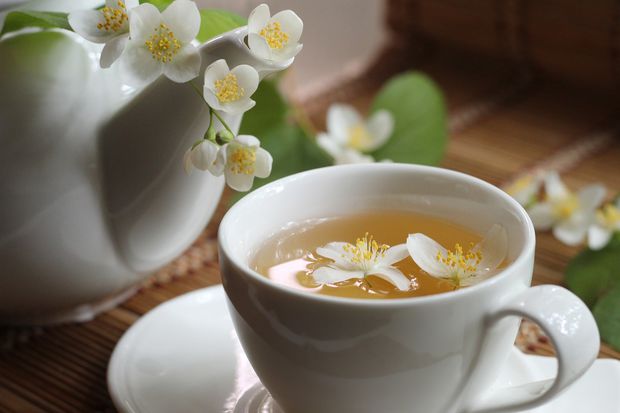
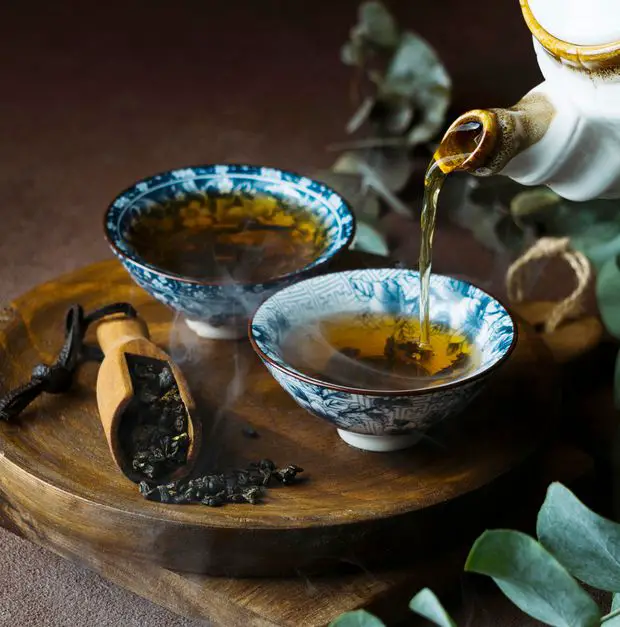
From its origin in tropical and subtropical regions of Asia, jasmine has become synonymous with elegance, tranquillity, sensory delight and wellbeing, but what are the benefits of jasmine tea?
The benefits of jasmine tea include promoting relaxation, aiding in hydration, providing antioxidants found in green tea, and creating a soothing experience for the mind and body. It is a delightful beverage choice with potential wellness attributes.
The essence of jasmine has found its way into various aspects of our lives, including the world of tea. In this article, we will explore the enticing benefits of jasmine tea, revealing how this aromatic elixir enhances our mood, senses, and well-being.
Jasmine tea is crafted by combining green tea leaves with jasmine blossoms, allowing their scents and flavours to intertwine. As the delicate flowers infuse their essence into the tea leaves, they create a visual and aromatic symphony that captivates the senses.
The vibrant green leaves interspersed with blooming jasmine buds offer a feast for the eyes, evoking a sense of serenity and natural beauty. The gentle fragrance of jasmine permeates the air, promoting a soothing atmosphere and inviting relaxation.
Jasmine tea is renowned for its aromatherapeutic properties. Inhaling the fragrant steam of a freshly brewed cup of jasmine tea can have a calming effect on the mind and body. The scent of jasmine is believed to reduce stress, alleviate anxiety, and promote a sense of well-being. It can serve as a gentle reminder to slow down, breathe deeply, and savour the present moment.

Beyond its mesmerising aroma, jasmine tea delights the taste buds with its delicate flavour profile. The infusion of jasmine flowers imbues the tea with a subtle, floral sweetness. When combined with the subtle bitterness and vegetal notes of green tea, it creates a harmonious and refreshing taste. Sipping on a cup of jasmine tea offers a momentary escape, allowing you to indulge in its subtle complexities.
Jasmine tea has a rich history deeply rooted in various cultures. It has been cherished for centuries in China, where the tradition of blending jasmine flowers with tea originated.
The meticulous process of scenting green tea with jasmine blossoms has been passed down through generations, preserving an age-old tradition.

In Chinese culture, jasmine tea holds symbolic significance. It is often associated with purity, grace, and elegance. Jasmine tea ceremonies, where the tea is brewed and served with utmost care and respect, are a testament to its cultural importance. These ceremonies not only celebrate the tea itself but also cultivate mindfulness, harmony, and connection with others.
Is Jasmine Tea Good for You?
With its warm aroma and delicate flavour, jasmine tea has captured the hearts of tea lovers worldwide. But beyond its sensory pleasures, is jasmine tea actually good for you? Let's explore the potential benefits and aspects to consider when it comes to incorporating jasmine tea into your lifestyle.
Antioxidant Boost
Jasmine tea, made by combining green tea leaves with jasmine blossoms, inherits the potential health benefits associated with green tea. Green tea is known for its high content of antioxidants, particularly catechins like epigallocatechin gallate (EGCG).
Antioxidants help protect our cells from oxidative damage caused by harmful free radicals. While further research is needed to determine the specific antioxidant properties of jasmine tea, it may contribute to overall well-being as part of a balanced diet and lifestyle.
Calming and Relaxing Effects
The delicate aroma of jasmine tea has been traditionally associated with relaxation and stress reduction. Inhaling the fragrance of jasmine can evoke a sense of tranquillity, potentially promoting a more relaxed state of mind.
While the effects may vary from person to person, taking a moment to savour a cup of jasmine tea can provide a peaceful respite from the demands of daily life.
Hydration and Wellness
Staying hydrated is essential for overall health, and jasmine tea can be a flavourful choice to quench your thirst. Whether enjoyed hot or iced, jasmine tea offers a refreshing and hydrating beverage option. Maintaining proper hydration supports various bodily functions and promotes overall well-being.
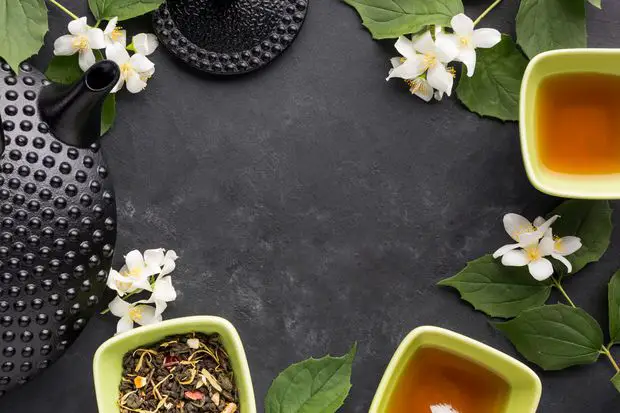
Mindful Ritual
In addition to potential health benefits, the act of brewing and savouring jasmine tea can be a mindful and ritualistic experience. The simple act of taking time for yourself, preparing the tea, and immersing yourself in its sensory delights can be a valuable practice in self-care and mindfulness.
Engaging in such rituals can contribute to overall wellness and help cultivate a sense of calm and presence. It is important to note that individual experiences and responses to jasmine tea may vary.
Factors such as personal health conditions, allergies, and sensitivities should be taken into consideration. If you have any specific health concerns or questions, it is advisable to consult with a healthcare professional.
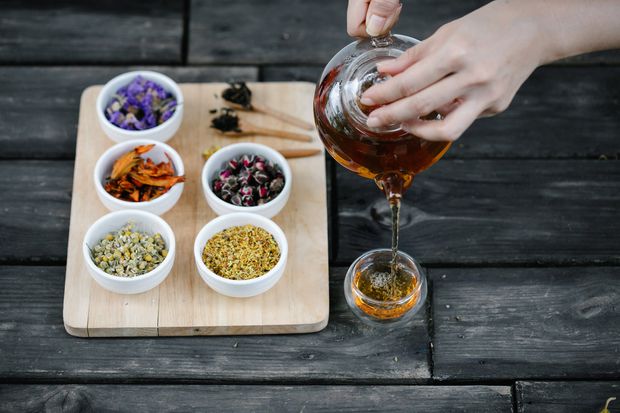
While jasmine tea can be enjoyed as part of a balanced lifestyle, it should not be viewed as a magical cure-all. It is always recommended to incorporate a variety of nutritious foods, regular physical activity, and a well-rounded approach to wellness for optimal health.
So, embrace the aromatic allure and subtle flavours of jasmine tea as a delightful addition to your daily routine. Whether you enjoy it for its potential health benefits or simply for the pleasure it brings, let jasmine tea be a companion on your path to well-being, one mindful sip at a time.
Is Jasmine tea good for colds?
When the sniffles and sneezes of a cold come knocking, seeking comfort in a warm cup of tea is a time-honoured tradition. But does jasmine tea have any specific benefits when it comes to easing cold symptoms?

Let's uncover the insights from ancient wisdom and modern reports to understand how jasmine tea might play a role in providing relief for common cold symptoms.
Throughout history, jasmine tea has been cherished for its delicate fragrance and calming effects. Traditional medicine systems, such as Traditional Chinese Medicine (TCM), have recognised the therapeutic properties of jasmine flowers. In ancient texts, jasmine was often celebrated for its ability to clear respiratory congestion and soothe sore throats.
While scientific research on jasmine tea specifically for colds is limited, green tea, which is the base of jasmine tea, has been studied for its potential health benefits. Green tea contains polyphenols, which are antioxidants that may support the immune system and help fight off infections.
Moreover, the act of sipping warm jasmine tea can provide temporary relief from common cold symptoms.
The steam rising from a freshly brewed cup can help soothe nasal passages and ease congestion, making breathing a little easier. Additionally, the gentle warmth of the tea can provide comfort and hydration, which is essential during illness.
Modern reports and personal anecdotes also indicate that jasmine tea can be a comforting companion during a cold. Tea enthusiasts often share stories of finding solace in a warm cup of jasmine tea, as its soothing aroma and gentle flavour create a sense of calm amidst discomfort.
It is important to note that while jasmine tea may offer some temporary relief for cold symptoms, it is not a substitute for medical treatment or professional advice. If you are experiencing severe cold symptoms or have any concerns, it's always best to consult with a healthcare professional.
Next time you are feeling under the weather, consider reaching for a cup of jasmine tea to provide a comforting respite. While scientific evidence may be limited, the ancient wisdom and modern reports surrounding jasmine tea's potential benefits for colds make it a delightful choice to accompany you on the road to recovery.
Allow the warmth, aroma, and soothing qualities of jasmine tea to bring a touch of comfort and wellness to your cold days.
Is Jasmine tea good for blood pressure?
In our quest for well-being, maintaining healthy blood pressure levels is crucial. Could jasmine tea, with its captivating aroma and delicate flavour, offer benefits for blood pressure?
Let's take a closer look at what both ancient wisdom and modern reports have to say about how jasmine tea may affect this important aspect of our health.
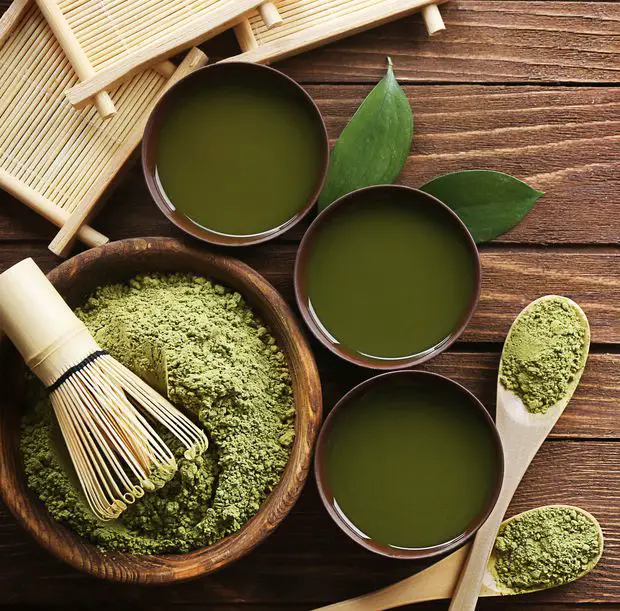
While scientific research specifically on jasmine tea's effect on blood pressure is limited, it's worth noting that the base of jasmine tea is often green tea. Green tea has been extensively studied for its potential health benefits, including its impact on blood pressure.
Green tea contains compounds known as catechins, particularly one called epigallocatechin gallate (EGCG), which is believed to have antioxidant and anti-inflammatory properties. Some studies suggest that regular consumption of green tea may be associated with lower blood pressure levels.
Jasmine tea, crafted by infusing jasmine blossoms with green tea leaves, inherits some of the potential health benefits associated with green tea. The delicate floral notes of jasmine complement the gentle bitterness of green tea, making it an enjoyable and refreshing choice.
Throughout history, jasmine has been revered for its therapeutic properties in traditional medicine systems, such as Traditional Chinese Medicine (TCM). While ancient texts often attribute various health benefits to jasmine, modern scientific studies specifically focusing on jasmine tea's impact on blood pressure are limited.
However, personal anecdotes and reports from tea enthusiasts suggest that sipping on jasmine tea can provide a momentary escape and relaxation, which in turn may contribute to a sense of well-being.
It is important to note that while jasmine tea may be enjoyed as part of a balanced lifestyle, it is not a substitute for medical advice or prescribed treatments for blood pressure management.
If you have concerns about your blood pressure or any specific health conditions, it's always best to consult with a healthcare professional for personalised guidance. They can provide you with appropriate recommendations based on your individual circumstances. Incorporating a cup of jasmine tea into your daily routine can be a delightful way to savour the moment and indulge in its subtle flavours.
While the scientific evidence surrounding jasmine tea's impact on blood pressure may be limited, the centuries-old reverence for jasmine and the enjoyment it brings to tea lovers make it a charming addition to a holistic approach to well-being.
So, take a pause, breathe in the fragrant aroma of jasmine tea, and relish the soothing experience it offers. While the full extent of its effects on blood pressure may still be unfolding, let jasmine tea be a companion on your journey towards a balanced and joyful life.
Final thoughts
There you go! Now you know the main wellness benefits of consuming Jasmine tea regularly, especially when feeling a little bit down. It is one of the go-to home remedies in Chinese traditional medicine and they swear by it!
